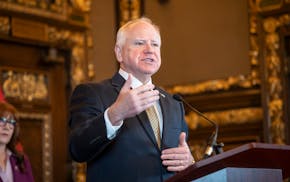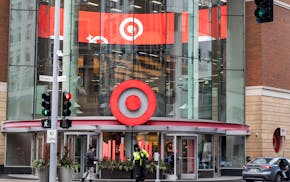Tariffs always roll downhill, like work no wants to do that's sometimes expressed with a four-letter word.
Some readers thought I forgot that bit of business gospel in my May 19 column defending Walmart against President Donald Trump's admonition that the world's largest company should "EAT THE TARIFFS."
Trump's criticism came after Walmart executives said during their quarterly earnings call they would eventually raise prices because of his new tariffs. My column examining the company's tight profit margins and explaining why it cannot wholly pay for the tariffs out of its bottom line prompted many comments and notes from readers.
Mike Hickey, who used to lead the Minnesota office of the National Federation of Independent Businesses, wrote that it won't be the huge corporations like Walmart that take the brunt of the tariffs.
"Based on a few of the conversations I've had, I am suspecting that small businesses end up eating a lot more of the tariff costs than large corporations," Hickey wrote.
Kevin Dulin of Wayzata, who leads a food company that does business with Walmart, said the retailer (which is also the nation's largest grocer) is putting pressure on suppliers not to raise prices.
"Thus, we will 'eat' any price impact coming from tariffs," Dulin wrote in an email. He said the company sources most of its ingredients in the U.S. but imports garlic and citric acid from China. The firm would need to raise prices 2% to 4% to cover higher costs from tariffs so far.
"Our statement to Walmart is, 'We are holding our prices,'" Dulin said. "Keeping our biggest customer, and the consumer, happy with stable prices seems prudent."
Also after that column, Ernie Denzer of Minnetonka suggested I look at the "bigger picture" of the tax cuts Trump and the Republican-led Congress are pursuing.
"Business will be able to keep prices at current levels or lower and pay the new tariffs because they will also soon be paying both lower business taxes and lower individual taxes on their executive salaries. So no loss of income," Denzer wrote.
Earlier in the month, I wrote a slight retreat from my full-throated support in 2023 for a ban on noncompete agreements, which bar employees from working for competitors for a period of time after they leave a job. After hearing from some readers, my sympathies grew again for individuals hurt by employers.
Mark Goodman of Minneapolis, a vendor representative in his mid-60s, asked to be freed from a noncompete agreement by his out-of-state employer as he eases into retirement. No, he was told.
"Recently, a small vendor asked if I could represent them for a few years to help them get up and running. Unfortunately, I had to decline because of my noncompete," Goodman said. "It really frustrates me when companies have you in a bind like this."
State Rep. Steve Elkins, DFL-Bloomington, a lead sponsor of the ban, wrote that businesses didn't always use noncompetes in the punitive manner that he believes merited the ban.
"Somewhere along the way, noncompetes took hold in a big way as a more convenient means to prevent behaviors that would be more appropriately addressed with nonsolicitation agreements or nondisclosure agreements," Elkins wrote. "I spent the last 25 years of my career as an IT consultant and signed more nondisclosure agreements than I could count along the way. I still guard trade secrets that I will carry with me to my grave."
Speaking of legislative duties, I heard once again from Kennedy City Clerk Melissa Woinarowicz after I wrote this past week that state lawmakers need to pass a bonding bill this year. The town in far northwest Minnesota has been trying for years to get state help to replace a water tower that froze in 2017, leaving residents to rely on a rural water supply from 18 miles away and its Fire Department unable to fight fires.
I cited Kennedy's difficulties last year as an example of maintenance that is falling behind because state lawmakers have gotten away from the regular schedule of issuing bonds for infrastructure projects.
"I wish there was something we small cities could do to make them understand how important it is to us," Woinarowicz wrote in her latest email.
I also heard a lot of feedback in late April after writing about a lawsuit against Nordic Ware of St. Louis Park for using "Made in the USA" labels on aluminum products, when the ore that aluminum is made from doesn't originate in the U.S.
"Who was harmed by Nordic Ware's allegedly egregious claim of Made in the USA?" Don Dewey of Minneapolis wrote. He then wondered why the lead plaintiff in the class action lawsuit was so upset: "If the guy really had heartburn over his purchase, would not a simple return and refund have sufficed?"
Finally, while I try to produce columns at timely moments, that didn't work early last month with a column on college sports headlined "This could be the week the NCAA becomes a professional league."
The column summarized a long-running lawsuit between former college athletes and the NCAA that I believed was about to get a final ruling. But the federal judge in California overseeing the case, Claudia Wilken, took another month and signed off on the ruling late Friday.
Only after my column ran did I catch up to a profile of Wilken the Wall Street Journal published in late April noting her Minnesota connections. Wilken grew up in Minneapolis and graduated from what was then Derham Hall High School in St. Paul. In a headline, the Journal called her "the most powerful figure in college sports history."

Ramstad: Gov. Walz, things are not getting done in Minnesota

Ramstad: AI is English-centric, but it's picking up Hmong quickly

Ramstad: Minneapolis' Camden neighborhood is rising. Houston White wants to keep it that way.

